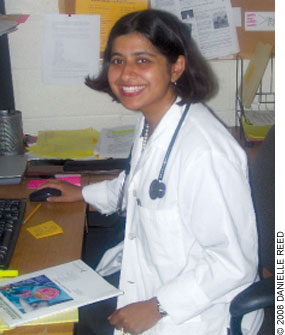
Am Fam Physician. 2008;77(12):1643
The first time I read American Family Physician was in my third year of medical school. I remember thinking that it was incredibly clear and comprehensive, a valuable resource for a student. It was actually written in plain English, unlike so many other scientific journals that are full of jargon.
I fell in love with the journal, and AFP shaped my choice of residency. When I came to rotate at Georgetown University/Providence Hospital's Family Medicine Residency Program as a fourth year medical student, I had the privilege of rounding with Jay Siwek, MD. I remember that week vividly, because I was so impressed with what I was learning daily. Dr. Siwek urged us to read extensively and to evaluate the available evidence thoroughly. During this time, I learned that Dr. Siwek was the editor of AFP, and that there was a medical editing fellowship at Georgetown.
I initially came to Georgetown University Family Medicine Residency Program because of its commitment to the underserved population in Washington, DC, as well as its strong academic environment. These same factors, in addition to the opportunity to work for AFP, subsequently led to my decision to pursue the John C. Rose Fellowship in Medical Editing and Faculty Development at Georgetown.
I feel very fortunate to have had such wonderful opportunities through this fellowship. I have learned so much about the inner workings of a medical journal and have had the privilege of working with many readers and authors. As a fellow, I have done a little bit of everything—I worked on manuscripts, editorials, patient education materials, artwork, and many other aspects of the journal. Being on the “inside” has made me develop an entirely new appreciation for the work of editors and authors alike. I learned how challenging it is to edit manuscripts, but also how demanding it is for authors to write them, respond to the peer review process, and revise them. I truly commend and thank all of you who have contributed and continue to contribute your wisdom to our journal and its readers.
In addition to working on AFP, I have been teaching medical students and residents at Georgetown University and Providence Hospital and seeing patients at Unity Health Care, a network of community health centers in Washington, DC. I can certainly say that editing AFP has made me a stronger teacher and a better physician. Throughout my fellowship, I have definitely taken the concept of “evidence based-medicine” and “evaluating evidence” to the next level, approaching the medical literature and the day-to-day treatment of patients with greater scrutiny.
My fellowship year is coming to an end, but I will be staying on with AFP next year as an assistant editor. Among other duties, I will be in charge of the series Putting Prevention into Practice, sponsored by the Agency for Healthcare Research and Quality, as well as the reports of the U.S. Preventive Services Task Force. I am honored to have had this opportunity and truly look forward to continuing my work with everyone at AFP.
